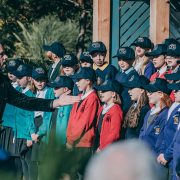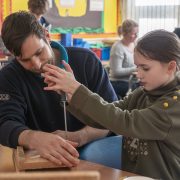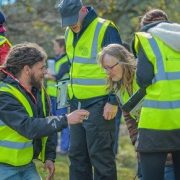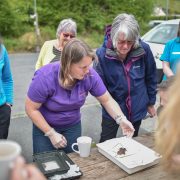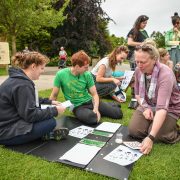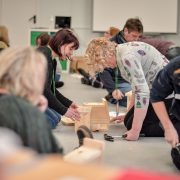We love collaborating with partners to find new ways to connect with audiences and deliver our mission of preventing extinction. Through working in partnership we also provide a wide variety of benefits to our community; enabling people to gain skills, support their wellbeing and deliver their own education curricula.
A visit to the zoo is a great way to connect with nature and improve knowledge and understanding about species and conservation, as well as providing valuable social opportunities. But, through reaching beyond our gates and working with partners, we can generate even greater benefits for wildlife and for communities. By working in partnership, we can support new people to experience the zoo, provide opportunities for deeper connections and further learning and ultimately inspire more conservation action to help prevent extinction.
Our community partnerships come in all shapes and sizes. We work with schools, colleges and universities, individuals, mental health support organisations, friends groups, care homes, uniformed groups, youth centres, disability groups, arts organisations, restaurants, businesses, voluntary groups and many more. All of our partners have different goals and objectives. Many of them not focused on wildlife conservation, but through collaborative working we can bring together their goals and our conservation objectives to ensure everyone benefits.
With our partners at Ignite Teaching School Alliance, we’ve worked to deliver teacher training, enabling 84 schools so far to focus their curriculum around one of our conservation campaigns. The partnership brings together our conservation education expertise and knowledge of conservation issues with the pedagogical and curriculum expertise of our partners. Together we have inspired over 20,000 pupils to take action for wildlife, whilst also supporting the schools involved to develop new pedagogical approaches and deliver a broad and balanced curriculum across all subjects.
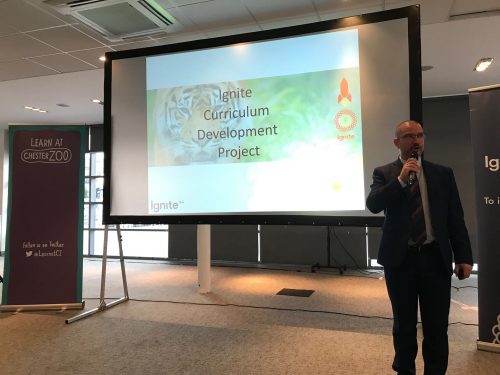
In other partnerships, we work with organisations to support mental health rehabilitation through volunteering and educational opportunities. Spending time in the zoo with our wonderful plants and animals, taking part in learning activities and connecting with new people can, when properly supported, be great ways to support wellbeing. Working with partners enables us to tailor our support so that new people can access opportunities at the zoo.
Whilst some of this work can be difficult to deliver due to current restrictions, we are finding ways to work with partners digitally. For many years we have worked with associate teachers from the University of Chester to provide opportunities for applying their teacher training in different contexts and inspiring them to prevent extinction with their pupils. In the middle of lockdown we worked together on a hack event where students had the chance to learn more about the work we do, and made suggestions for how we can develop our own virtual offer in the most curriculum relevant way. The event not only enriched the students’ understanding of curriculum and of working with cultural organisations like the zoo, but has inspired our own approach to the benefit of many more schools and pupils.
Providing training and resources for our community is key to our approach. Through our Wildlife Champions training courses we equip group leaders with the skills and knowledge to take conservation action for local wildlife. Through the sessions they go on to deliver with their own groups, they create or improve habitats and achieve wide-ranging benefits for the groups that they work with. One of our champions describes the benefits to the residents she works with:
“I think the benefits for residents from getting involved with the activities and from us developing in the garden are that it gets rid of boredom. Coming outside into the fresh air and natural light is only going to benefit their health, well-being and mental state, because we’re actually going to be doing something and when you come out into nature it’s just a completely different atmosphere all together. It can benefit their rehabilitation as they come out to walk outdoors and means that they actually want to come out because it’s a nice inviting environment to be in”.
For us, the key to successful partnerships is really understanding each partner’s ambitions and then making sure our work together meets everyone’s objectives. By being creative and working together we can prevent extinction and achieve significant benefits for our community, helping diverse partners meet their own objectives too.
We have SO MUCH to offer when it comes to learning. From dozens of amazing LEARNING RESOURCES, to our fun and educational SCHOOL TRIPS.
